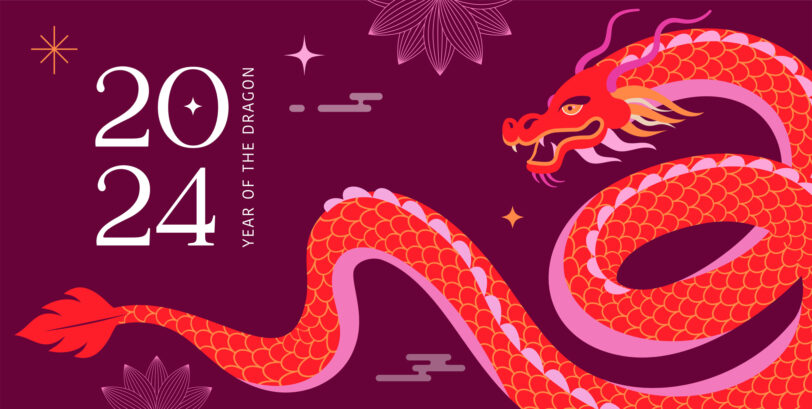
The Lunar New Year 2024 is the Year of the Dragon.
How the Lunar New Year is Celebrated
The Lunar New Year, also known as the Spring Festival, is celebrated to mark the beginning of the lunar calendar year. The date of Lunar New Year varies each year, as it is based on the lunar calendar, which follows the cycles of the moon.
This year, Lunar New Year falls on Saturday, Feb. 10th, with 2023 being the year of the rabbit and into 2024 as the year of the dragon. The dragon has represents good luck, justice, prosperity and strength.
In the Chinese Zodiac, there are 12 animals. Each has its own attributes and characteristics. These 12 animals coincide with the lunar calendar in a 12-year cycle.
The order of the Chinese Zodiac is:
- Rat
- Ox
- Tiger
- Rabbit (in Vietnam, the rabbit is replaced by the cat)
- Dragon
- Snake
- Horse
- Goat
- Monkey
- Rooster
- Dog
- Pig
The celebration is deeply rooted in various East Asian cultures, including Chinese, South Korean, Vietnamese, Thai and others. It is a time for family reunions, paying respects to ancestors, and welcoming the arrival of spring. The festival typically lasts for about 15 days, with various customs and traditions observed during this period.
Some of the common customs and activities associated with Lunar New Year include:
- Reunion and Family Gathering: Families make an effort to come together, often traveling long distances to celebrate the festival with their loved ones.
- Feasting: Special foods and meals are prepared, and it is customary to have a large feast during the New Year celebration. Certain foods, such as dumplings and fish, have symbolic meanings related to prosperity and good luck.
- Cleaning and Decorating: Homes are thoroughly cleaned to symbolize getting rid of the old and welcoming the new. Red decorations, lanterns, and other festive items are used to bring good luck and ward off evil spirits.
- Worship and Ancestral Tribute: Many people visit temples and perform rituals to pay respects to gods and ancestors. Offerings may include food, incense, and symbolic items.
- Dragon and Lion Dances: Colorful dragon and lion dances are performed in the streets, accompanied by loud music and firecrackers. These performances are believed to bring good luck and drive away evil spirits.
- Red Envelopes (Hongbao or Ang Pao): It is a tradition to give and receive red envelopes containing money, which is believed to bring good fortune and prosperity to the recipient.
- Lantern Festival: The celebration often concludes with the Lantern Festival on the fifteenth day of the lunar calendar, where people carry lanterns, solve riddles, and enjoy various activities.
Overall, Lunar New Year is a time of joy, reflection, and the beginning of a new cycle. It holds cultural and spiritual significance for many communities, emphasizing themes of family, luck, and renewal.



